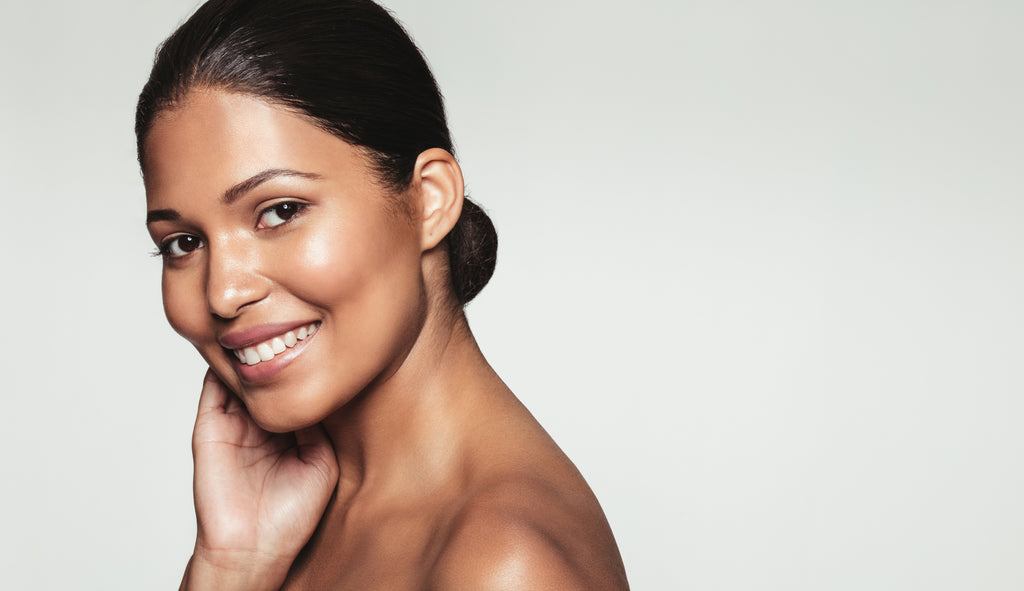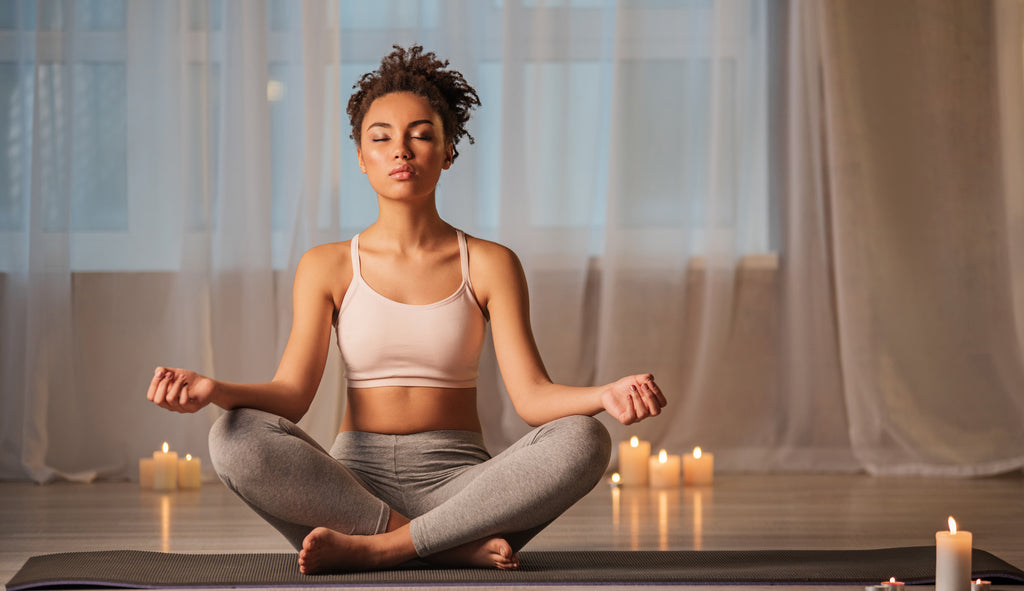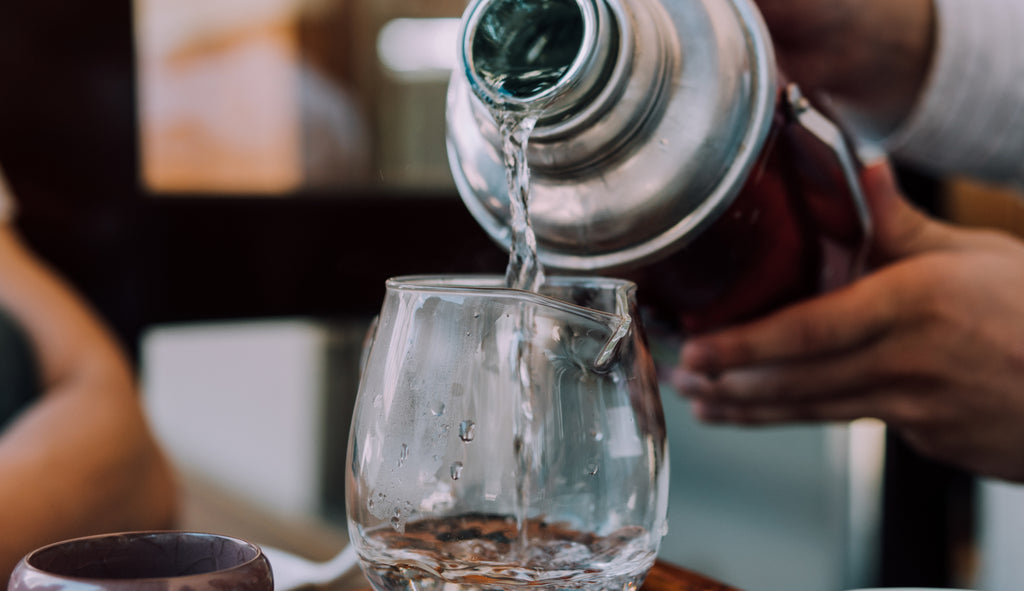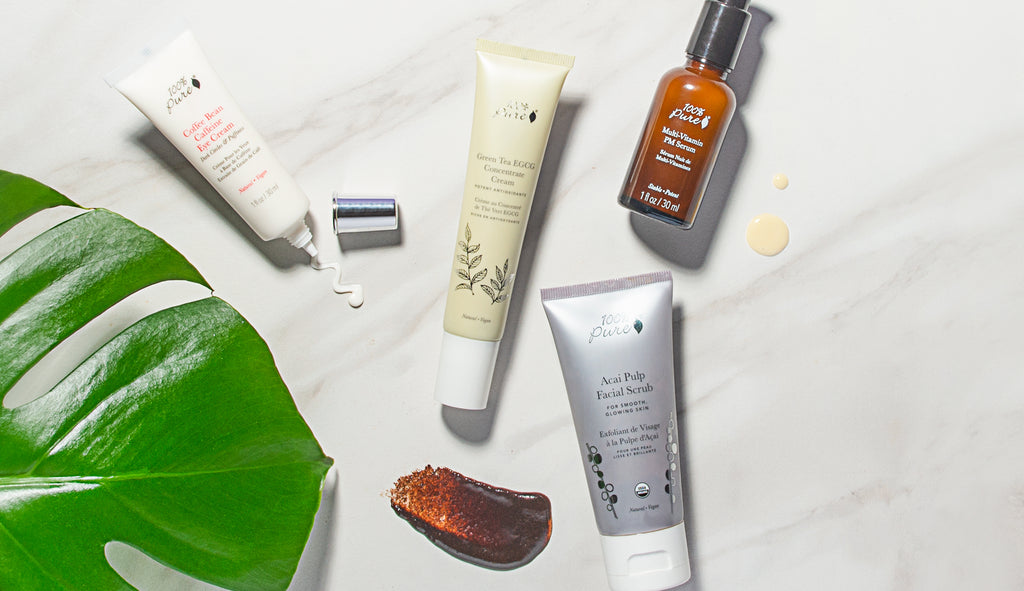11 Factors for Healthy Skin
Pave your way to healthier, happier skin
Posted on October 27, 2020 Written by: 100% PURE ®
We believe that skin care should be key in your approach to healthy skin – but not the only tool in your arsenal.
Buying thoughtfully-formulated products that feature plant ingredients rather than harmful chemicals is a great first step toward taking conscious care of your skin. However, other lifestyle factors such as diet, sleep cycle, and exercise can have an enormous impact on the health of your skin tissue – meaning they should all be addressed if you expect your skin to look glowy and fresh!

In order to maintain healthy skin, it’s crucial to eat right and stay hydrated. Healthy foods provide your body with the building blocks it needs to heal wounds, maintain elasticity and vibrance, and balance the bacteria in your skin.
Fruits and vegetables
Dermatologists recommend you eat plenty of leafy green vegetables, and consume a variety of fruits and vegetables each day. You should also make sure to pack in the healthy fatty acids from a variety of sources like nuts and avocados.
Inflammatory foods
Inflammation is thought to be a key culprit behind skin aging, and can also worsen the symptoms of acne and other skin conditions. To control inflammation throughout your body, you could try switching to a dermatologist-approved anti-inflammatory diet. At the very least, make a point to avoid inflammatory foods, and seek out anti-inflammatory foods instead. While these diets include non-vegan foods, it’s easy to customize them to suit a vegan diet.
Food allergies
It’s also important to note that food allergies and sensitivities can manifest themselves on your skin. If you’re experiencing unusual breakouts that you think might be caused by something you’re eating, consider keeping a food diary. Analyze what you eat, and when your breakouts occur. This can help you quickly figure out what’s causing the problem, and how to cut back.
Some acne-causing foods are: white sugar, fast or fried food, dairy, and milk chocolate. We also recommend speaking to a professional dermatologist or nutritionist to get to the bottom of your breakout, and help you find the best diet for your system.
Exercise can reduce inflammation throughout your body, promote circulation, and potentially help to maintain the health of your telomeres, literally keeping your body more youthful at the cellular level. Exercise can also promote lymphatic drainage and healthy cortisol levels, both of which promote skin clarity and balance.
You should aim to get at least 15 minutes of intense physical activity per day, or 30 minutes of moderate physical activity. Getting the right amount of exercise also promotes lymphatic drainage, your body’s natural process of flushing out toxins.
Skipping out on a good night’s sleep is one of the worst things we can do to our skin. When you don’t get enough sleep, your body produces larger quantities of the stress hormone cortisol. Cortisol triggers inflammation throughout your body, resulting in redness, breakouts, and irritation.
As inflammation takes hold, your body starts to produce less collagen and hyaluronic acid, resulting in a loss of brightness, smoothness, and suppleness. Your body also takes care of important processes like balancing hydration as you sleep, so missing out on sleep will deprive your body of the chance to keep your skin’s moisture properly regulated.

As we discussed, the stress hormone cortisol can contribute to skin damage and aging (not to mention internal and mental health) in several ways.
It’s never been more crucial than now to properly manage stress for mental health – and for skin health! With 2020 being a very stressful year for everyone, it’s important to cope with these new stressors, fears, and anxiety with new stress management techniques. Practicing mindfulness where you’re able to tune out current stressors and be in the moment can offer a nice mental break.
As we mentioned, exercise – including meditation and breathing exercises – can address stress all the while not requiring you to go far. Trying movements such as yoga and tai chi can help manage stress, and there are plenty of online classes and tutorials to help you out. Other good choices include paring down on your to-do list or creating a balanced schedule between your daily pursuits and responsibilities. This can help you address burnout and unnecessary stress.
While there are many stress management techniques out there, the best option is whichever one works best for you! Some of our favorite stress management techniques include exercise, crafting, journaling, and just relaxing with friends. But whatever you choose, make sure it’s something you enjoy so you’re more likely to stick with it. To learn more about stress management, check out our blog on how to relieve stress in 4 easy steps!
Most of your vitamins for skin should come from your diet, as your body can process vitamins from food more efficiently than vitamins from supplements. However, vitamin C supplements can go a long way toward skin health, and are generally considered safe for most consumers. If you have a vitamin B, A, or E deficiency, you may want to consult your doctor about supplementation.
Other supplements, like magnesium and phosphate, can make a big difference for skin health in individuals who are prone to deficiencies. Remember: always consult your doctor before beginning any course of supplement use – especially if pregnant or breastfeeding.

From smoke to pollution to even the foods we consume, our environment plays a huge role in how our skin looks and behaves. These types of skin irritants can clog your pores, increase your chance of breakouts, and interrupt your skin’s natural protection systems. This leads to dry skin and other inflammatory skin conditions.
Putting a detoxifying routine in place can treat your skin in accordance with your environment. In addition to a clean diet and skin-saving tips, a skin detox is also the best way to purge those pores of environmental pollutants! We recommend starting with a gentle detoxifying cleanser every other day. The right mask can deeply detoxify pore-clogging pollutants and purify the skin, to get it back to optimal health. A healthy water intake is also a must for detoxified skin!
Regular exfoliation purges your skin of pore-clogging debris, and helps replenish and revitalize your complexion. This step is important for removing surface pollutants from the skin, as well as any excess dirt, sebum, and impurities. It’s an easy way to get softer, more supple skin and brings you that much closer to a clear complexion.
It’s key to choose an exfoliator that is on cue with your skin type and needs:
-
For the gentlest exfoliation, we recommend simply using a konjac sponge with your regular liquid cleanser. Bonus: this sponge contains detoxifying bamboo charcoal!
-
For exfoliation that’s not too gentle or too strong, powder cleansers are a perfect middle ground. These will exfoliate and cleanse your skin at the same time, and you can customize their texture depending on how much water you add.
-
For serious exfoliation, we recommend our Acai Pulp Facial Scrub. This super fruit-infused scrub packs plenty of buffing powder to slough away bumps, flakes, and dead layers while revealing fresh, more supple skin. For more tips on using these products be sure to check out the basic exfoliation tips for your skin type.
We’ve all heard this before, but it’s important to protect your skin with sunscreen every single day. Over time, your body produces free radicals in response to UV exposure. These rogue electrons can cause irreversible damage throughout your skin tissue, leading to wrinkles and fine lines, dark spots, and the loss of suppleness and elasticity.
Whether it’s rain or shine, summer or winter, a crucial step in your daily beauty routine is applying SPF to guard your skin against sun damage. If you’re already made up and don’t want the hassle of messing up your glam with a heavy sunscreen, our Yerba Mate Mist SPF 30 will be your BFF! This light refreshing spray provides you with skin-loving nutrients, hydration, and protection.
But not all SPF is created equal, depending on how and where you need adequate protection. For everyday use, our Green Tea SPF 30 is a natural sunscreen lotion that does double duty by protecting against harmful rays with zinc oxide, while delivering toning and hydration benefits with aloe and green tea. Thanks to raspberry, avocado, and rosehip oils, your skin will reap the lingering moisture benefits of this sunscreen all day long.
Most dermatologists recommend that you cleanse your skin once in the morning and once in the evening, and additionally after exercising or sweating heavily. There’s no need to use harsh chemicals such as denatured alcohols in order to cleanse your skin, though: a gentle, natural cleanser like our Blood Orange Cleansing Balm can get the job done perfectly without compromising your skin health.
In the evening, it’s important that you remove any makeup and sunscreen from the day in order to prevent clogged pores. If you prefer to practice the Korean double-cleansing routine, start with a water-based cleanser like our Rose Micellar Water, followed by an oil-based cleanser like our Argan Oil Creamy Cleanser or Blood Orange Cleansing Balm.

“Moisturization” and “hydration” are often used interchangeably, but there’s an important difference between these two concepts. “Hydration” literally refers to hydrating, or delivering water to, the cells in your skin. In contrast, “moisturization” refers to reinforcing your skin’s lipid barrier with oils and other nourishing ingredients. Moisturizing your skin helps to keep hydration locked in, so it’s important that you get a combination of hydration and moisturization in your skin care routine.
Still wondering how to use both for a healthy skin routine? Read more about the critical balance between moisture and hydration, and how it can help your skin achieve a more youthful, supple glow.
PRO TIP: Staying hydrated can work wonders for a clearer, more supple complexion. Ample hydration through regular water intake throughout the day will greatly increase skin’s health and glow.

We’re diehard believers that clean, organic, and natural skin care is the best way to topically maintain the health of your skin. Using key ingredients from plants, seeds, fruits, and herbs, clean formulas will be unhindered by artificial ingredients and fillers that can reduce potency and benefits for your skin.
By seeking out natural products that are free of parabens, artificial fragrances, and other harsh ingredients, you’ll ensure that you’re taking care of your skin at the cellular level, and supporting its long-term health.
We carefully hand-select products based on strict purity standards, and only recommend products we feel meet this criteria. 100% PURE™ may earn a small commission for products purchased through affiliate links.
The information in this article is for educational use, and not intended to substitute professional medical advice, diagnosis, or treatment and should not be used as such.
Sign up to our email newsletter for more blog updates and exclusive discounts.
< Older Post | Newer Post >








